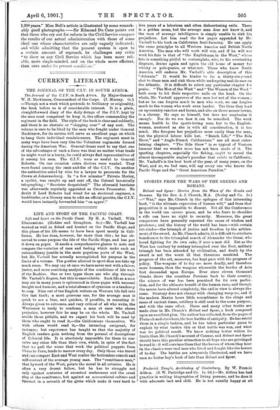STORIES FROM THE WARS OF THE GREEKS AND ROMANS.
Helmet and Spear : Stories from the Wars of the Greeks and Romans. By the Rev. A. J. Church, M.A. (Seeley and Co. 5s.) —" War," says Mr. Church 'in the epilogue of this interesting book, "is the ultimate expression of human will," and from that proposition it is impossible to dissent. Not all the Conferences in the World can ensure peace, and he who fears to shoulder a rifle can have no right to security. Moreover, the great conquerors have generally espoused the cause of wisdom and prudence ; and the history of the world has been—with certain interludes—the triumph of justice and freedom by the arbitra- ment of the sword. As Mr. Church admits, it is difficult to attribute beneficence to the triumphal march of Alexander the Great, who loved fighting for its own sake, if ever a man did. But as the West has century by century triumphed over the East, military triumph has been attended by civilisation, and death by the sword is not the worst ill that threatens mankind. The progress of the art, moreover, has kept pace with the progress of policy. The weapons of to day are more deadly, and therefore more humane, than the weapons wherewith the hordes of Asia first descended upon Europe. Ever since eleven thousand Greeks drove the countless Persians back to their country, the science of war has been practised for its own perfec- tion, and for the ultimate benefit of the human race; and though the means have altered completely, the end in view is always the same. Strategy does not change with changing weapons, and if the modern Maxim bears little resemblance to the slings and rams of ancient times, artillery is still used to the same purpose, and with the same effect. These and many other truths are made clear in Mr. Church's Helmet and Spear, a book composed upon an excellent plan. The author has collected, from the pages of Plutarch and elsewhere, the best battles of antiquity. He has retold them in a simple fashion, and be has taken particular pains to explain by what tactics this or that battle was won, and what was its political result. We know nothing better within its limits than Mr. Church's account of Cannae, and Helmet and Spear should have this peculiar attraction to all boys who are privileged to read it : it will convince them that the heroes of whom they hear in the classics were real men who lived and fought like the heroes of to-day. The battles are adequately illustrated, and we have seen no better boy's book of late than Helmet and Spear.






































 Previous page
Previous page